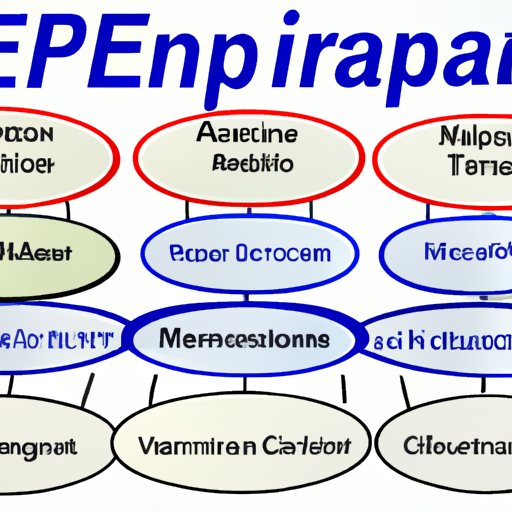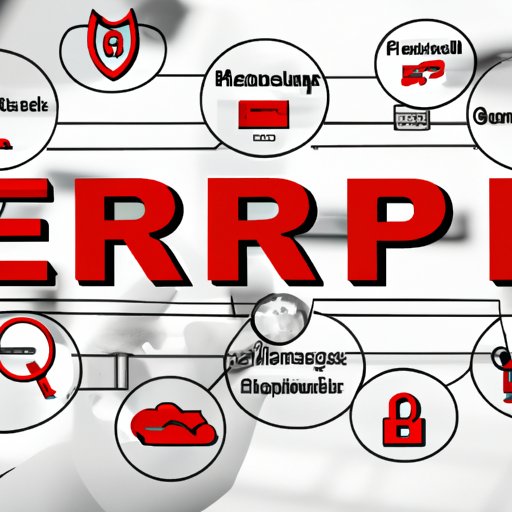Introduction
Enterprise resource planning (ERP) is a vital tool for businesses of all sizes. It helps organizations manage their operations more efficiently and effectively by automating processes and integrating data from multiple departments and applications. But what is ERP in information technology specifically, and how does it impact IT? In this article, we’ll explore the benefits of ERP in information technology, provide an overview of ERP systems in IT, discuss how to choose the right ERP system for your IT needs, and explain the common challenges faced when implementing ERP in information technology.
Exploring the Benefits of ERP in Information Technology
ERP in information technology offers numerous benefits, such as improved efficiency, cost savings, and increased visibility. Here’s a closer look at each:
Improved Efficiency
ERP systems in IT allow organizations to streamline business processes, eliminate manual data entry, and reduce paperwork. This can save time and money while improving accuracy, which leads to higher efficiency. ERP systems also offer real-time insights into operations, enabling businesses to make better decisions and respond quickly to changing customer demands.
Cost Savings
ERP systems can significantly reduce operational costs. By automating tasks, eliminating manual data entry, and reducing paperwork, ERP systems can help businesses save on labor costs. In addition, ERP systems can help organizations maximize resources and optimize processes, leading to further cost savings.
Increased Visibility
ERP systems can provide comprehensive views of operations, allowing businesses to identify areas where improvements are needed. This increased visibility can lead to better decision-making and improved customer service.

An Overview of ERP Systems in Information Technology
When exploring ERP in information technology, it’s important to understand the different types of ERP systems and the components they include. Here’s an overview of each:
Types of ERP Systems
There are several types of ERP systems, including cloud-based ERP, on-premise ERP, and hybrid ERP. Cloud-based ERP systems are hosted in the cloud and require no installation or maintenance. On-premise ERP systems are installed locally and require regular maintenance and upgrades. Hybrid ERP systems are a combination of cloud-based and on-premise ERP systems.
Components of an ERP System
ERP systems typically include components such as financial management, inventory management, human resources, customer relationship management (CRM), manufacturing, and supply chain management (SCM). Each component includes features such as budgeting, forecasting, reporting, analytics, and tracking.
A Guide to Choosing the Right ERP System for Your IT Needs
Choosing the right ERP system for your IT needs can be a challenge. Here are some tips to help you find the right solution:
Assessing Current and Future Business Needs
Before selecting an ERP system, assess your current and future business needs. Consider the type of organization you have, the size of your company, the number of users, the complexity of your processes, and any special requirements you may have. This will help you determine the type of ERP system that is best suited for your organization.
Analyzing Your Business Processes
Analyze your current business processes to identify areas that could benefit from automation or integration. Consider how an ERP system could simplify or streamline existing processes and create efficiencies. This will help you determine the features and functionality you need in an ERP system.
Researching ERP Vendors
Once you have identified the type of ERP system you need, research vendors to find one that meets your requirements. Look for a vendor with experience in your industry, a proven track record of success, and excellent customer service. Be sure to ask questions and read reviews to ensure you select the right vendor.

Common Challenges Faced When Implementing ERP in Information Technology
Implementing ERP in information technology can present several challenges. These include change management, data migration, and training & adoption. Here’s a closer look at each:
Change Management
ERP systems often involve changes to existing processes and workflows, which can be difficult for some employees to adjust to. To ensure successful implementation, it’s important to communicate the changes to employees, provide adequate training, and create incentives for adoption.
Data Migration
Data migration is another common challenge when implementing ERP in information technology. It can be difficult to transfer data from legacy systems to an ERP system. To ensure successful data migration, it’s important to plan ahead, test the migration process, and use automated tools to facilitate the process.
Training & Adoption
ERP systems often require specialized training for users. It’s important to provide adequate training to ensure users understand how to use the system and are comfortable with the new processes and workflows. Additionally, it’s important to incentivize adoption to ensure users are using the system correctly.
How ERP Can Help Streamline Business Processes in IT
ERP systems can help streamline business processes in IT in several ways. These include automation & integration, improved data quality, and real-time analytics. Here’s a closer look at each:
Automation & Integration
ERP systems can automate and integrate processes across departments and applications. This can save time and money while improving accuracy and consistency. Automation also eliminates manual data entry, reducing errors and freeing up staff to focus on other tasks.
Improved Data Quality
ERP systems can help improve data quality by providing real-time access to accurate, up-to-date information. This can enable businesses to make better decisions and respond quickly to changing customer demands.
Real-Time Analytics
ERP systems can provide real-time insights into operations, allowing businesses to monitor performance, identify trends, and make informed decisions. This can help businesses optimize processes and increase efficiency.

The Role of ERP in Enhancing Information Technology Security
ERP systems can also help enhance information technology security. Here’s a look at how:
Security Compliance
ERP systems can help organizations meet security compliance requirements by providing powerful access controls and monitoring capabilities. This can help organizations protect sensitive data and ensure compliance with industry regulations.
Access Controls
ERP systems can provide granular access controls to ensure that only authorized users have access to sensitive data. This can help organizations protect their data from unauthorized access and prevent data breaches.
Disaster Recovery
ERP systems can also help organizations prepare for disaster recovery. With ERP systems, businesses can back up data regularly and store it in secure locations. This can help minimize downtime and ensure that data is available in the event of a disaster.
Conclusion
ERP in information technology can provide numerous benefits, such as improved efficiency, cost savings, and increased visibility. It’s important to understand the different types of ERP systems and the components they include, as well as how to choose the right ERP system for your IT needs. Additionally, it’s important to be aware of the common challenges faced when implementing ERP in information technology and how ERP can help streamline business processes in IT. Finally, ERP systems can help enhance information technology security by providing security compliance, access controls, and disaster recovery.
(Note: Is this article not meeting your expectations? Do you have knowledge or insights to share? Unlock new opportunities and expand your reach by joining our authors team. Click Registration to join us and share your expertise with our readers.)
